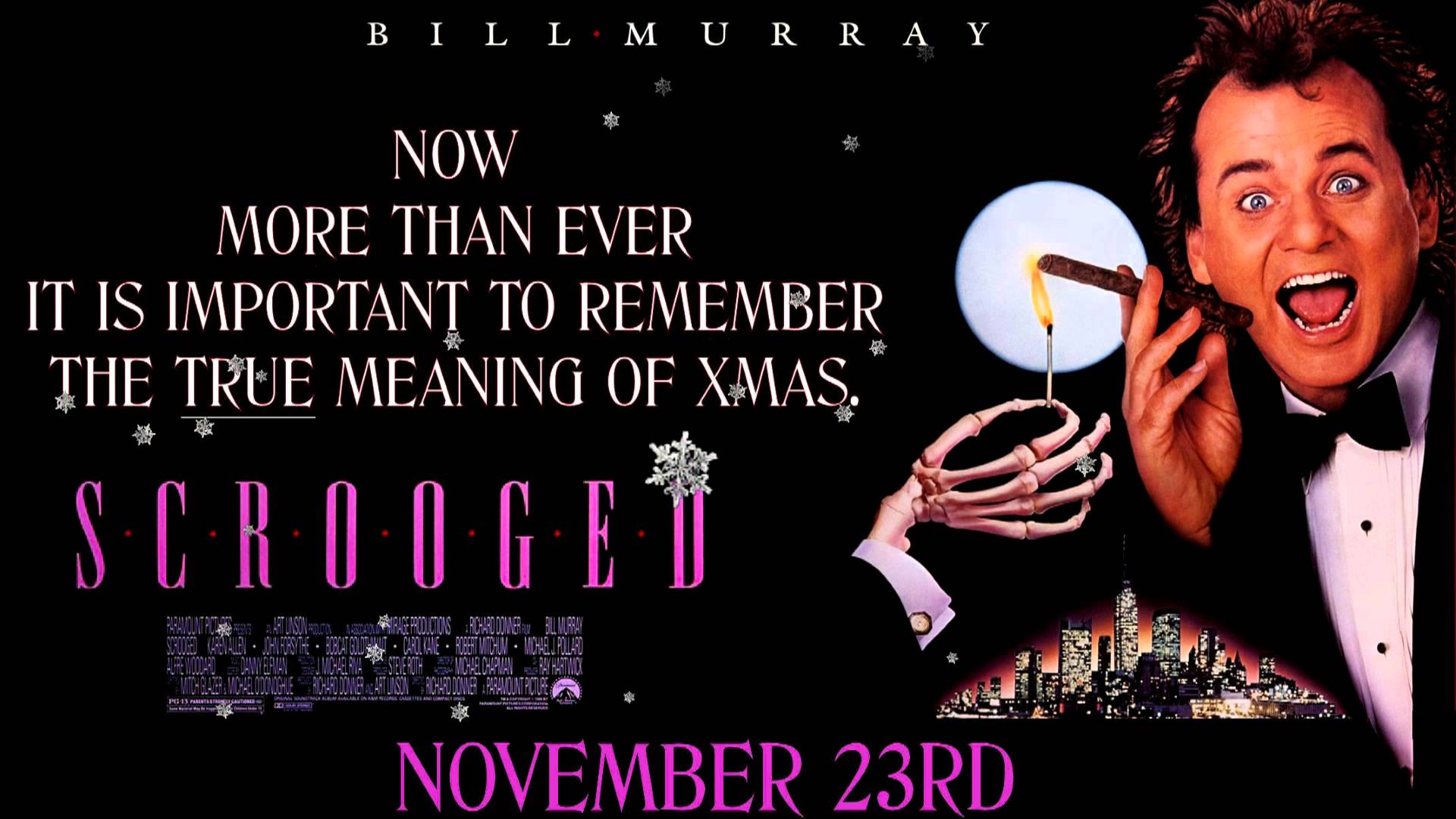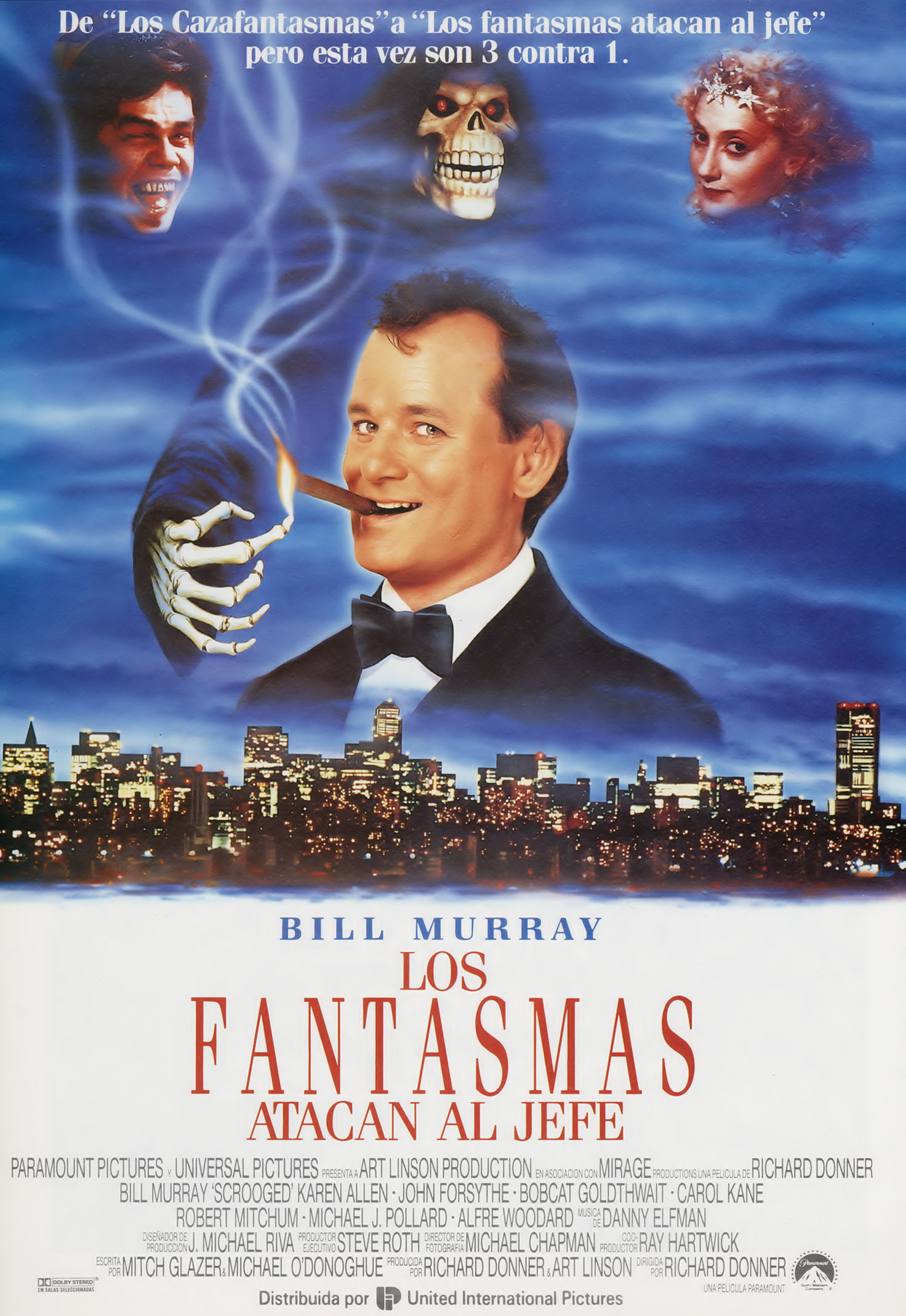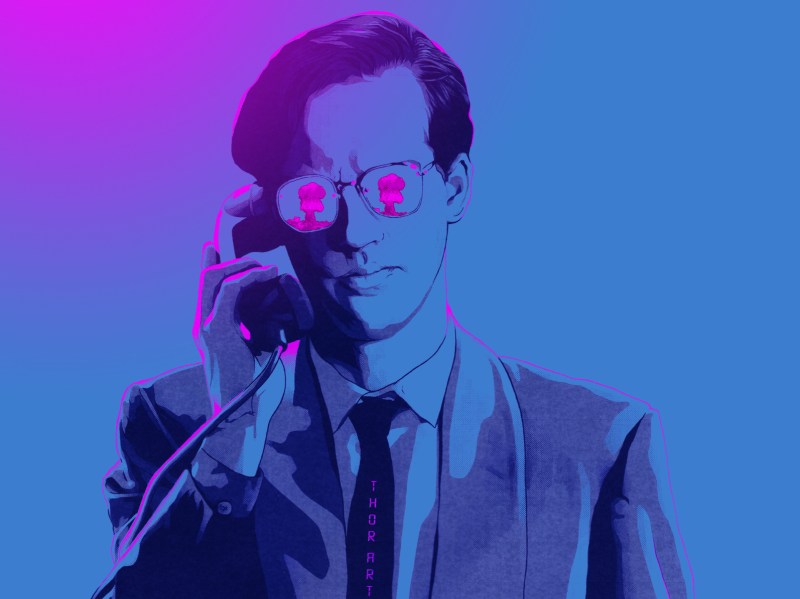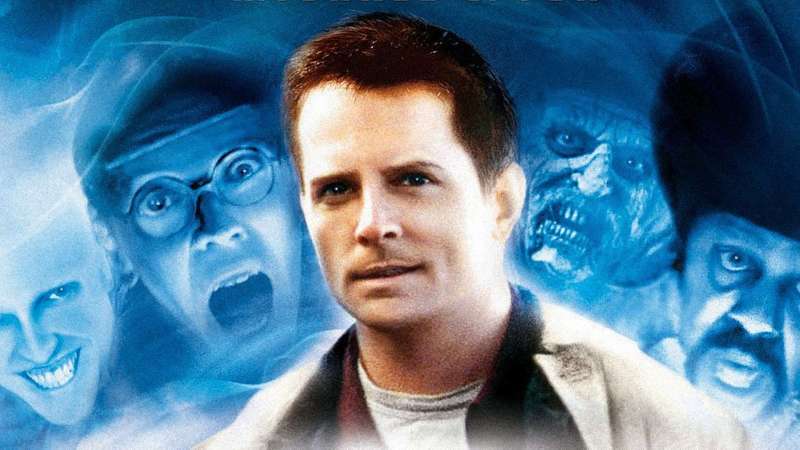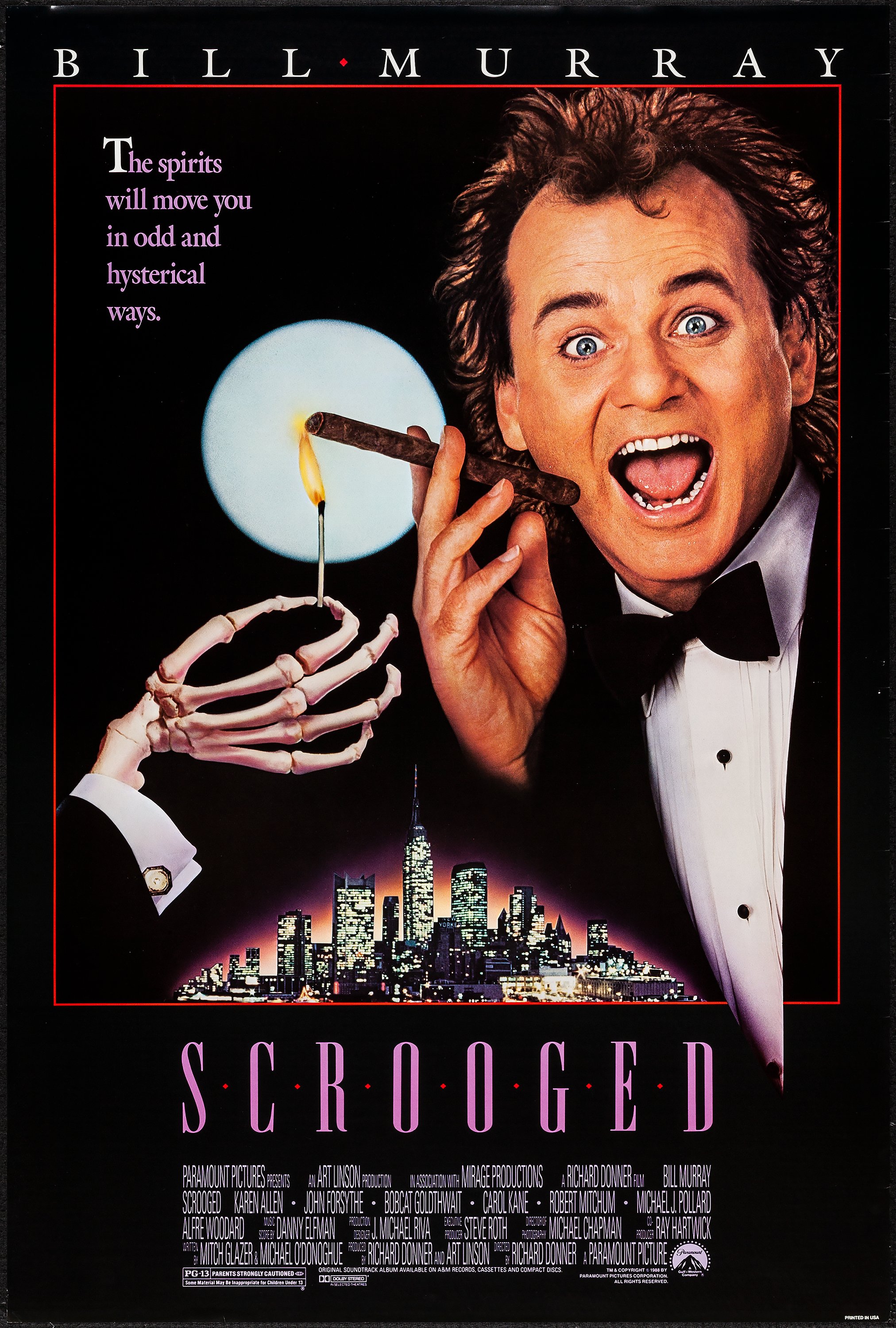
Dickensian satire meets Reaganite America in Richard Donner’s offbeat retelling of a Christmas Carol
Published in 1843, A Christmas Carol was the first of Charles Dickens’ Christmas stories to be released. The novella was an unmitigated success, and in the years following its publication would be re-interpreted for stage, radio and the cinematograph numerous times with the earliest known film adaptation, Marley’s Ghost, directed by Walter R. Booth, debuting in 1901. It wouldn’t be the last. By the time Scrooged came along in 1988, literature’s most celebrated miser had featured on-screen in a number of different guises. The most memorable of these was the Alister Sim version in Brian Desmond Hurst’s 1951 classic, Scrooge. This would remain the definitive version for many a year to come. Whilst Scrooged can hardly be credited as the film to knock that movie off its perch, it certainly is zanier and a heck of a lot funnier. Richard Donner, pop cinema’s most under-appreciated journeyman, fresh off the back of his success with Lethal Weapon, would direct from a script by Saturday Night Live alumni Mitch Glazer and Michael O’Donoghue. Bill Murray, meanwhile, would star as the film’s protagonist after a 4-year acting hiatus — a cameo in Little Shop of Horrors notwithstanding — following the success of Ghostbusters and failure of 1984’s little seen coming-of-age yarn The Razor’s Edge.
Murray, who’d already passed Scrooged over two years prior whilst on an acting break, claimed to be drawn to the script on his return to cinema. This was due to the comedic approach adopted by fellow SNL graduates O’Donoghue and Glazer. Murray would receive a fee of $6 million for starring in the movie but would insist on making tweaks to the script prior to filming. The love interest angle with Karen Allen’s Claire was subsequently elaborated and changes to key family scenes, which Murray claimed were a little bit ‘off’. Filming commenced in December 1987 and would take place partly at the Seagram Building in New York and mostly on a soundstage in Hollywood. Donner and Murray clashed over the tone of the movie throughout. Donner would claim directing the comedian was ‘like standing on 42nd Street and Broadway … the lights are out, and you’re the traffic cop.’ Murray, meanwhile, was no less acerbic. In an interview in 1989 the actor claimed ‘we shot a big, long sloppy movie’ most of which ended up on the cutting room floor. Murray would go on to recount in subsequent interviews that the process of filming Scrooged was an unpleasant experience compounded by his being the lone star and having to work long hours in increasingly difficult circumstances.

Criticism of the film wasn’t confined to the director and his star. Scriptwriter O’Donoghue would weigh in too, claiming that Donner didn’t understand comedy, and that a significant chunk of the script Donoghue and Glazer submitted was jettisoned during filming. Despite a marketing campaign that played up Murray’s on-screen history of ghostbusting, critical reception for the movie was damning. Roger Ebert awarded the movie a single star stating that it was one of ‘the most disquieting, unsettling films to come along in quite some time.’ The film would do limited business at the box office on its release and would finish up the year as the 13th highest grossing film of 1988.
I was a captain of industry; feared by men, adored by women.
Lew Hayward
The film’s plot unfolds along similar lines to the Dickens classic, updating the action from Victorian London to Reagan era New York. TV exec Frank Xavier Cross is substituted for Ebenezer Scrooge and proves every bit as miserable, misanthropic and humbug as his predecessor. Frank is lonely. He drinks too much. He is brash and short tempered and intimidates his subordinates. He harangues street musicians (Miles Davis included!), undervalues his secretary, dismisses his brother, bullies senior citizens and generally behaves abysmally. At the film’s commencement, Frank is overseeing a live action production of Scrooge for the festive season. His ad campaign for the show results in an old woman dying from apoplexy. On set, things are not running as smoothly as they ought. His boss Preston (Robert Mitchum) has developed a disconcerting penchant for household pets whilst slick yuppie wunderkind Brice Cumming (John Glover) is attempting to usurp him at the head of the corporate trough. As if that wasn’t enough, as Frank starts to come apart, he is visited by the rotting corpse of a former work colleague Lew Hayward (John Forsythe). Lew, standing in for Jacob Marley, warns Frank his soul is in peril. He tells him he will be visited by three spirits (which he promptly is), prior to dropping him out of the window of an upper-storey skyscraper.
Taking advantage of the Victorians’ burgeoning interest in Christmas celebrations and ghost stories, Dickens’ original novella was a roaring success. Dickens was able to effortlessly pitch the redemptive tale of Ebenezer Scrooge as mainstream entertainment. However, scratch the surface and it becomes apparent that A Christmas Carol is as much a conscientious social satire grappling with big themes of inequality and the damaging psychosocial effects of capitalism on individualism, as it is a ghost story set in the holiday season to scare the kids up and inflame the middle classes. Similarly, whilst Scrooged appears to be an irreverently mounted Bill Murray vehicle that exploits the Dickens classic to squeeze Thanksgiving dollars out of wintertime cinema goers, scratch the surface and you’ll discover hidden depths.
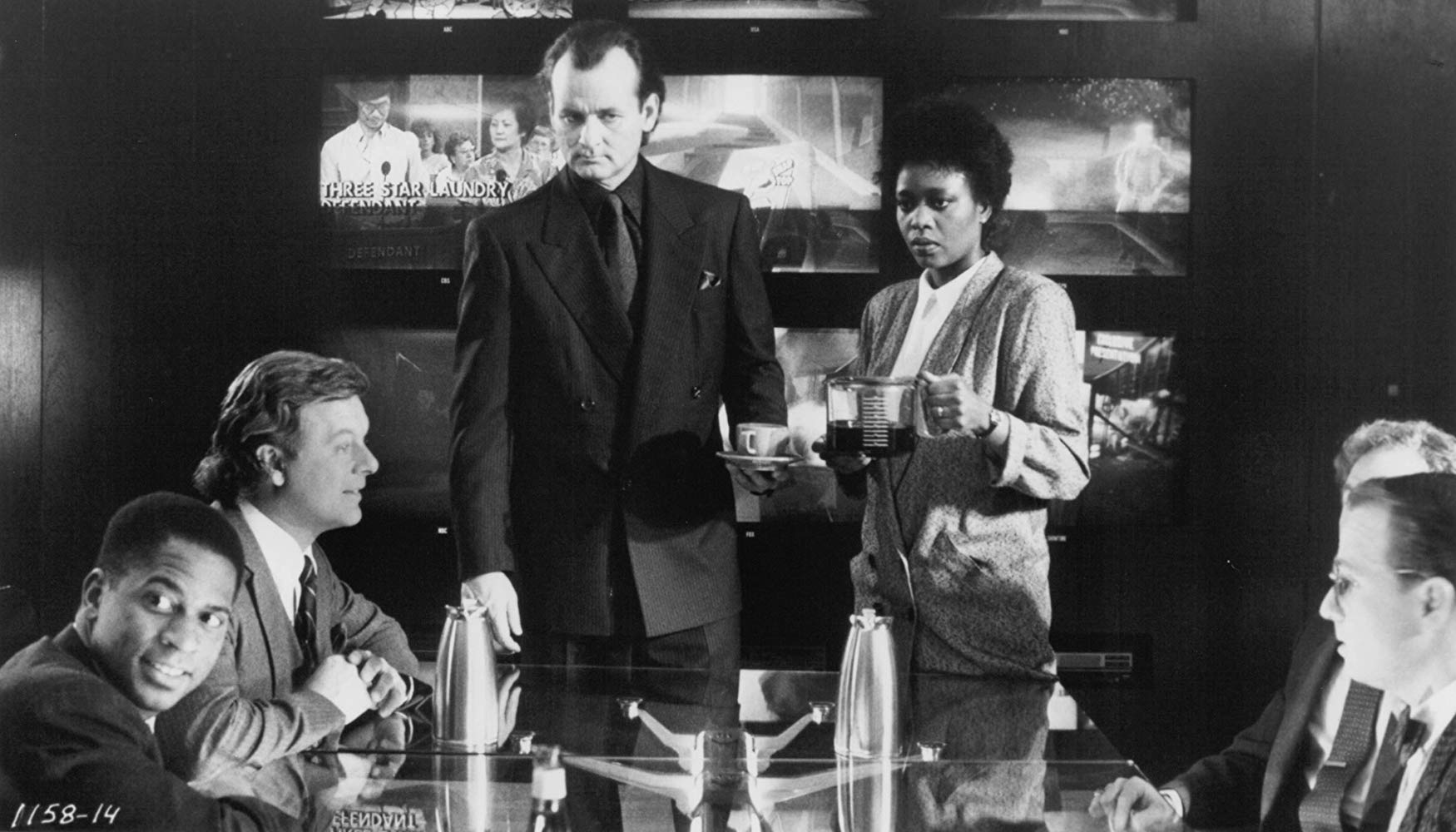
Scrooged is by turns a redemptive fiction that rails against the conservative revolution of 1980s America and its negative implications for those engaged with it and a dysfunctional satire on the entertainment industry itself. The live action ‘production within a production’ Frank is overseeing, which seeks to capitalise on the commercial viability of Christmas by exploiting the Dickens classic for all its worth, cleverly inverts Dickens’ core message of compassion. The show is a corporate endeavour devised in a boardroom. It features a scantily-clad dance troupe (The Solid Gold Dancers) and mice with antlers tacked to their heads to help boost ratings. Frank’s own experience runs parallel to this production. As the story unfolds and Frank is exposed to how much of a corporate shit he’s become, the two versions of A Christmas Carol converge in the film’s ultimate denouement. During this denouement, Frank rights the wrongs of the production by addressing the viewer directly and waffling on about the true meaning of Christmas after berating everyone for watching too much television in the run up to the holiday season.
Murray’s performance, which casts a cartoonish shadow over the film’s entirety, is quintessential Bill: deadpan, zany, off the cuff, and impertinent. It is also an incredibly loud performance, which the actor himself acknowledged in a subsequent interview, claiming the director ‘kept telling me to do things louder, louder, louder. I think he was deaf.’ In spite of this, Murray’s penchant for veering into wacky, improvised territory pays dividends. His final monologue, though a tad saccharine, is a 4th wall breaking, rambling delight. It may go on a bit and it may be a bit incoherent, but there’s no avoiding the fact that by the time he starts spouting lines from Little Shop of Horrors and the cast has joined in to sing a spontaneous rendition of the Annie Lennox and Al Green cover, Put A Little Love In Your Heart, the audience has been won over.
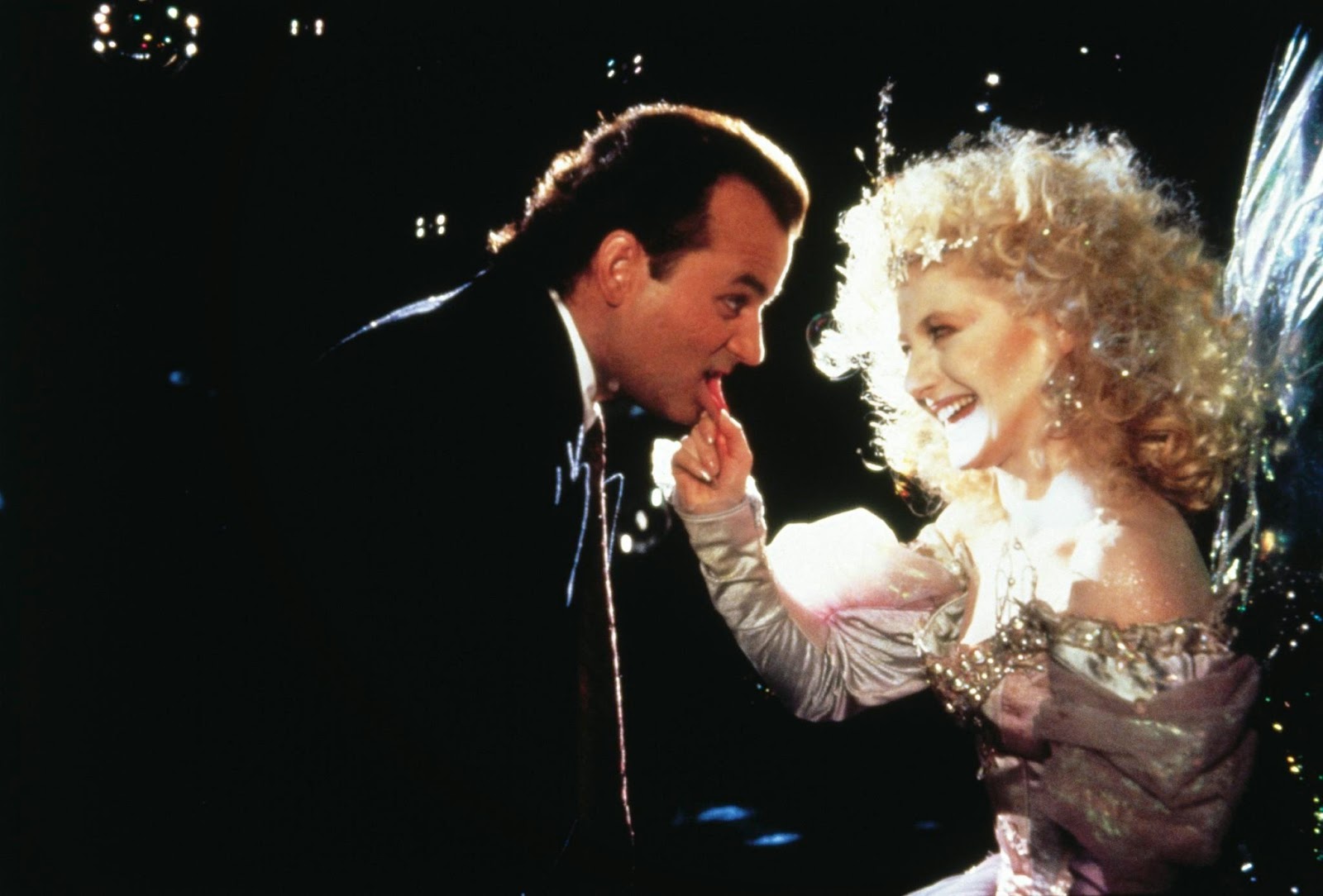
Some of the film’s support roles are a bit troublesome. Bobcat Goldthwaite’s sacked employee moves from mild mannered underling to shotgun wielding alcoholic in a matter of minutes, despite the obvious time limitations. Karen Allen’s flimsily articulated Claire dumps her personal responsibilities helping the needy at the drop of a pin in the hope that perennial dickhead Frank will finally learn to empathise. Alfre Woodard as Grace Cooley and her disadvantaged family adhere to African American stereotypes to maintain the illusion of happy poverty; this is despite Grace working for the wealthiest TV exec in town. Frank’s brother, meanwhile, James, in a flip of the social coin, exists in a chill out knitwear utopia where white folks play trivia games and are compassionate and forgiving.
Why do you keep calling me “Dick”?
Frank Cross
Still, the film comes fully into its own via its depiction of the ghosts. The Ghost of Christmas Past, played by former New York Dolls frontman David Johansen, is a cackling, pointy-eared delight. Presented as a bum cabbie with a time machine decked out as a big yellow taxi, the spirit is a cigar chomping trickster, whose habit of blowing smoke out of his ears and careening around the city like a drive-angry maniac provides the film with some of its comedy highlights. Similarly, Carol Kane’s Ghost of Christmas Present, a pantomime fairy godmother in full fancy dress, is also a hilarious presence. The spirit gleefully assaults Frank at every opportunity, punching him, kicking him in the nuts and smashing him with a toaster with slapstick abandon. Finally, there’s The Ghost of Christmas Yet to Come, Death essentially, who has a video screen for a face, and shrieking moaning puppet souls living between its ribs.
Ultimately Scrooged is a mixed bag, hindered by tonal uncertainty and a surplus of activity. It’s hard in retrospect to discern how it ever received a PG certificate. The film is peppered with sex references, drug use references, anti-social behaviour and general mean spiritedness. It also features an inordinate amount of comedy violence some of which wouldn’t be out of place in a Coen Brothers or Sam Raimi movie. Later scenes are genuinely scary. The scene in which Frank finds himself locked in a casket as the crematorium burners flare up is the claustrophobic stuff of audience members’ nightmares.
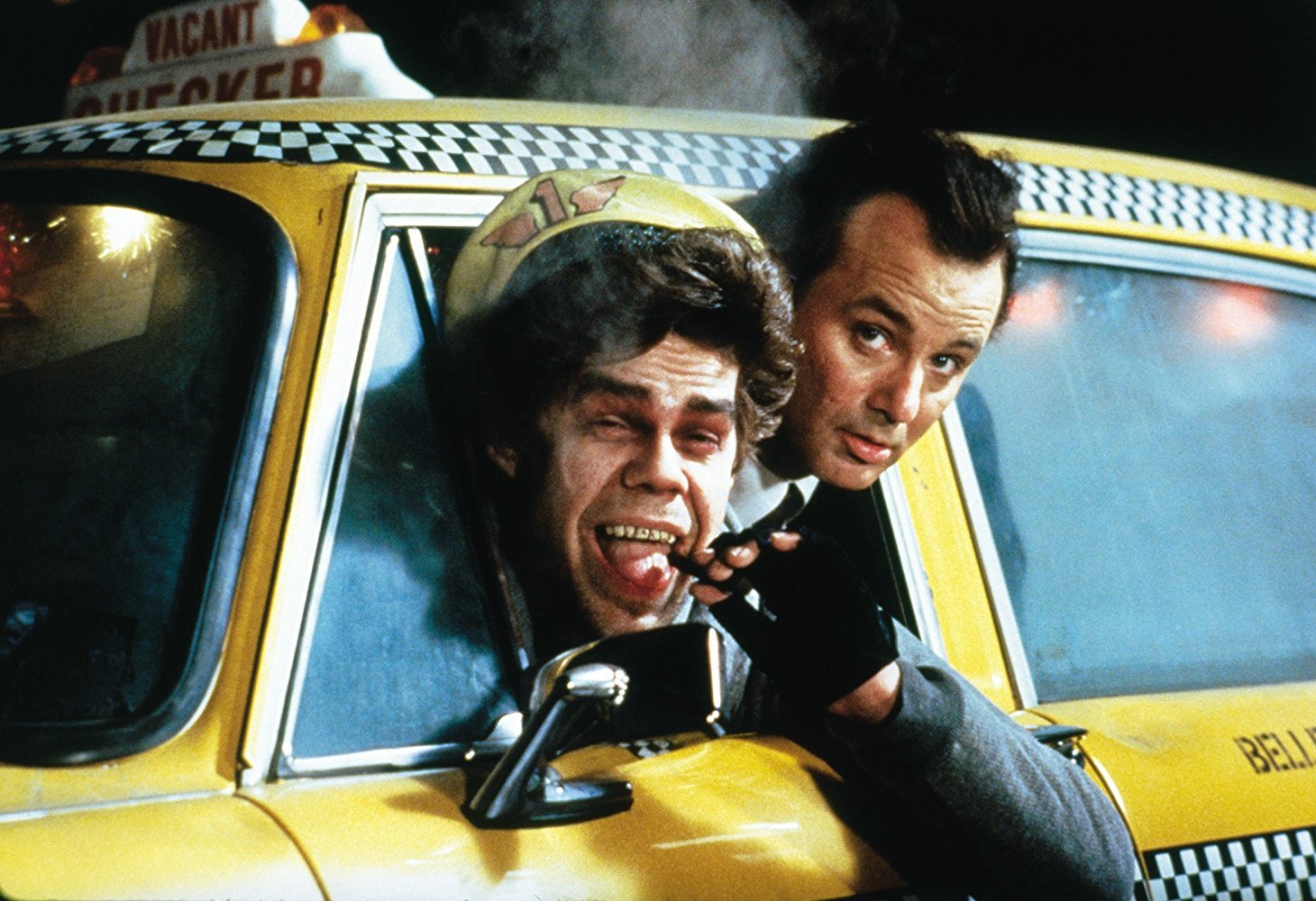
That said, as an alternative Christmas movie the film works a treat. Though it may have faded from cinemas in the 80s as it struggled to find its audience, in the intervening years it has developed a sizeable fan base. It has also left its mark on subsequent Scrooge related productions which, for the most part, have adopted its idiosyncratic approach to the material to endear them to the public. There’s The Muppet Christmas Carol from 1992, featuring everyone’s favourite felt-head ensemble. There’s Robert Zemeckis’ CG fright-fest A Christmas Carol from 2009 with Jim Carrey voicing Ebenezer Scrooge. Then there’s The Man Who Invented Christmas from 2017, relating the story of how Dickens came up with A Christmas Carol in the lead up to its publication.
With Kevin Hart reportedly in talks about a Scrooged remake and a further BBC adaptation of A Christmas Carol set for a December 2019 release, interest in the story is as healthy as ever. It’s only a matter of time, one suspects, before an interactive version is foisted on the public, one in which the audience decide Scrooge’s fate, though whether he will continue to be redeemed in the future is a matter that is up for debate. Bah, Humbug!
Director: Richard Donner:
Screenplay: Mitch Glazer &
Michael O’Donoghue
Music: Danny Elfman
Cinematography: Michael Chapman
Editing: Fredric Steinkamp &
William Steinkamp



